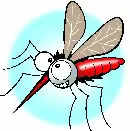Prayagraj: With a fresh case of dengue reported from Kareli locality, officials of the health department on Wednesday assigned five teams of Domestic Breeder Checkers (DBC) to check water stagnation and mosquito breeding in and around 50 houses in the Kareli area located near the dengue patient. On Wednesday, a 24-year-old youth tested positive for dengue and was admitted to SRN hospital for treatment. District Malaria Officer (Prayagraj) Anand Singh told TOI, “With this, a total of 13 dengue cases were reported between January 1 and August 7.
DBC teams have been assigned to check all residential and commercial buildings at all 30 hotspots.” Teams of domestic breeding checkers (DBC) are carrying out checks in houses and buildings located in low-lying areas. The teams are carrying out checks at deserted colonies and households to find breeding sources of Aedes mosquitoes.

Singh, meanwhile, said, “Over one lakh houses will be checked by the teams by November 30.” Besides, as many as 18 spraying workers are also covering hotspot areas. Officials claimed that all measures are being taken to ensure proper sanitation and fogging is also being carried out in the city on a regular basis.
Officials said the support of locals was essential to make areas mosquito-free. We also published the following articles recently DBC teams to prevent, control dengue In Prayagraj, district health authorities mobilized 30 teams of Domestic Breeder Checkers to combat dengue by inspecting both residential and commercial areas for mosquito breeding grounds. By November 30, seven teams will scan over one lakh houses.
Awareness campaigns and fogging activities have also been initiated to prevent water stagnation and reduce mosquito breeding. Malaria, dengue cases on the rise in tribal areas of north Andhra Hospitals in Parvathipuram Manyam and Alluri Sitarama Raju districts were overwhelmed by the increase in malaria and dengue cases. Heavy rains and blocked drainage systems turned areas into mosquito breeding grounds.
Authorities identified high-risk villages and initiated measures like special medical camps, cleanliness drives, and active surveillance to control the situation. Albopictus, mosquito that caused dengue surges in 1950s, back in Kolkata The return of Aedes albopictus, a dengue-carrying mosquito, to Kolkata has raised concerns due to its shift in breeding habits. Previously found in rural areas, the species is now breeding in urban environments like abandoned tires.
This change has puzzled entomologists, who have been monitoring the dengue surge in recent years..



















